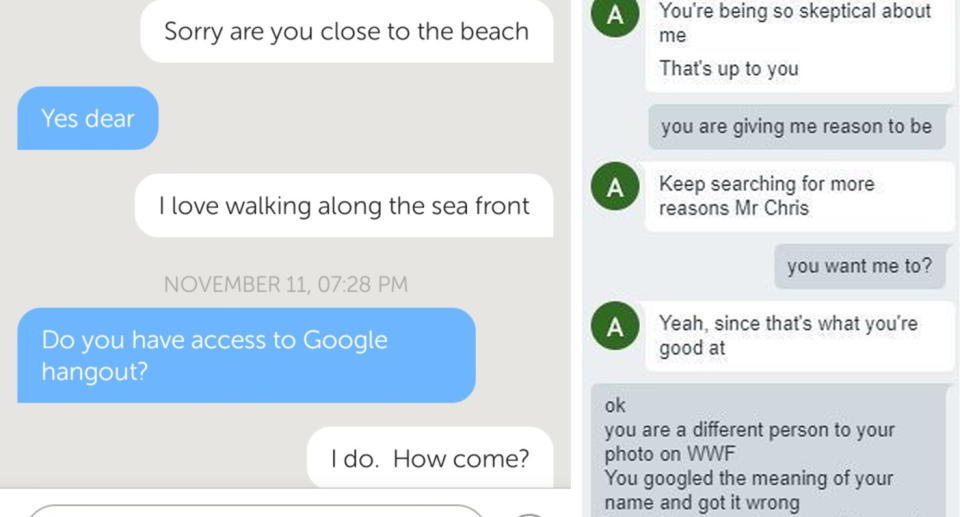Aussies fleeced of thousands in Words with Friends love scam
Fraudsters are using a wide variety of online platforms to target lovelorn victims in elaborate romance scams, including a growing shift towards finding targets on unlikely apps like Words with Friends.
The popular app which allows users to play one-on-one games of scrabble with strangers from around the world has been used as a portal by scammers to steal nearly $600,000 from Australian users in 2019.
Ahead of Valentine’s Day, the ACCC’s Scamwatch warned that official figures are likely just the “tip of the iceberg”.
A new trend emerging in 2019 involved scammers increasingly turning to apps like Google Hangouts, or online games such as Words with Friends and Scrabble to con their victims, the ACCC warned.
“No longer are dating websites the only contact method for dating and romance scams, with an increasing number of reports coming from these emerging websites and apps,” said the ACCC’s deputy chair Delia Rickard.
Scammers have ‘different scripts’
It’s believed that many of the scammers are operating out of African nations such as Ghana and Nigeria and target people around the world.
British man Craig Buck works in IT and is a frequent Words with Friends player. He says the number of scammers operating on the app seemed to increase around September last year.
“All of a sudden I was getting these messages from people claiming to be Americans but from their grammar it was obvious they weren’t,” he told Yahoo News Australia.
After initiating conversation, the scammer typically asks if the person is single before insisting on moving the conversation to Google Hangouts where it’s less likely they will have their account shut down.
“They’ve got different scripts they run through. I’ve had people on oil rigs in the Middle East, people who have had sick relatives,” Mr Buck explained.
“I’ve got one scammer that I’m dealing with at the moment, they’ve tried to scam me three different ways for Amazon gift cards. The first time it was their birthday, then their aunty was sick and now their phone is broken.”

Mr Buck strings along the scammers trying to get as much information out of them before reporting their account and exposing the tricks they use on his blog Against Scammers dedicated to warning people.
But getting them fully removed is all but impossible. His efforts to report scam accounts to Zynga, the parent company of Word with Friends, and to Google often fall on deaf ears. “These big companies aren’t doing anything about it,” he said.
Just from routinely playing the app, Mr Buck says he encounters about one scam artists a week. When talking to them on Google Hangouts, inconsistencies in their story are a dead giveaway of their fraudulent nature, he says.
‘I was not in control of anything’
While Mr Buck knows what to look for, others aren’t so circumspect.
“Perpetrators are deliberately targeting people to get them to fall in love. Because by doing that they know they can have power over them,” says Victorian woman and scam victim Jan Marshall.
“The business model is working.”
Ms Marshall was duped in a particularly ruinous online scam in 2012. After speaking to a man online for 72 days, and falling in love with him, she sent her scammer $260,000 which she never saw again. Making matters worse, she took money out of her self-managed super fund incurring a hefty tax bill, adding to her loses.
She has since set up an advocacy group for other victims called Life After Scams to help people deal with the shame of being duped in a romance scam.
“I’ve had hundreds of people contact me from all around the world, both men and woman of all ages who have been scammed,” she told Yahoo News Australia. “Often they will say I am the only person they have spoken to.”

Ms Marshall said scammers are increasingly contacting people on any online platform that allows users to chat. Particularly platforms that are not associated with dating and users are less suspicious.
“I’ve had number of people report that they met their scammer on Words with Friends,” she told Yahoo News Australia. “While one woman was scammed while on a language learning site.”
Another growing trend she has seen is scammers targeting people on LinkedIn.
“They are very sophisticated, they certainly know what works ... It’s just a question of where they can talk to people.”
While it can be hard for most people to imagine sending money to someone they’ve never met in person, Ms Marshall says the romance element is crucial in prying a “loan” out of their targets.
“The victims don’t get told they’re special, they don’t get told they’re loved by anybody else.
“When I was in that scam, I was not in control of anything,” she said of her own experience.
Scammers typically use a stolen picture and fictitious identity to lure their victims. Numerous online forums detail their incessant tactics which, judging by the figures, are effective enough to fleece meaningful amounts of money from people.
Aussies lost $28.6 million to romance scams last year
The $598,075 that Australians were duped out of via scams originating from Words with Friends was just a fraction of the $28.6 million that Aussies lost in romance and dating scams last year, with social media platforms being a hotbed of scams.
Of the roughly 4000 reported dating and romance scams reported last year, about 37.5 per cent involved a financial loss to the victim with the average loss being $19,000, according to the ACCC’s Scamwatch.

The highest losses occurred via social media with Instagram being the most popular social media platform to contact victims.
“Romance scams are particularly devastating because not only are there financial losses, but there is also an emotional toll for the victim, which can have lasting psychological impacts on people,” the ACCC’s Ms Rickard said.
But despite the emotional and financial turmoil that can be wreaked, it is an almost impossible thing to stamp out.
Given the transnational nature of the scams and the difficulty in tracing people, police face a futile exercise when cases are actually reported.
“There is no record of police doing anything about it,” Ms Marshall lamented. “There is no prosecution.”
Do you have a story tip? Email: newsroomau@yahoonews.com.
You can also follow us on Facebook, Instagram and Twitter and download the Yahoo News app from the App Store or Google Play.




